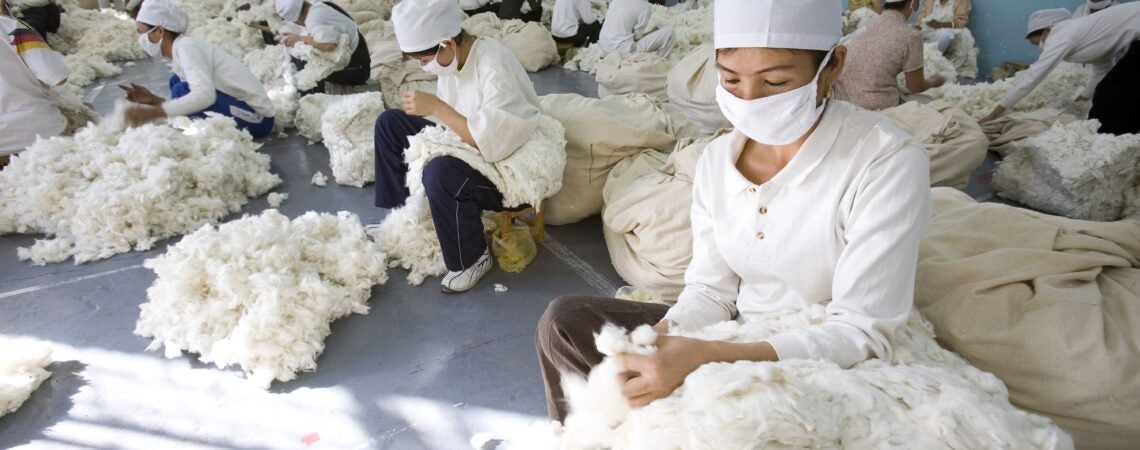Ambassador Dennis Shea served as U.S. Permanent Representative to the World Trade Organization during the Trump Administration. He is now an Adjunct Fellow (Non-resident), Scholl Chair in International Business at the Center for Strategic & International Studies (CSIS). Today a commentary of Amb. Shea was posted by CSIS. See CSIS Commentary, Dennis Shea,The WTO Can Help Shine a Spotlight on Forced-Labor Practices in Xinjiang’s Cotton Industry, https://www.csis.org/analysis/wto-can-help-shine-spotlight-forced-labor-practices-xinjiangs-cotton-industry.
Amb. Shea notes that there is an upcoming “dedicated discussion” on trade developments on cotton at the WTO on May 28. His commentary states that
“For next month’s dedicated discussion to have credibility, it must examine the trade impact of the use of forced labor to pick cotton in China’s Xinjiang province. In light of what we have learned about forced-labor practices in Xinjiang, it is inconceivable that the WTO would convene a meeting on cotton and trade and not include these practices as a topic worthy of review. Simply put, ignoring what is happening in Xinjiang would be tantamount to the WTO holding a meeting on global public health and trade without mentioning the Covid-19 pandemic.”
I have in prior posts looked at the issue of forced labor and child labor both broadly and with special focus on cotton. SeeMarch 24, 2021, When human rights violations create trade distortions — the case of China’s treatment of the Uyghurs in Xinjiang, https://currentthoughtsontrade.com/2021/03/24/when-human-rights-violations-create-trade-distortions-the-case-of-chinas-treatment-of-the-uyghurs-in-xinjiang/; January 25, 2021, Child labor and forced labor in cotton production — is there a current WTO mandate to identify and quantify the distortive effects?, https://currentthoughtsontrade.com/2021/01/25/child-labor-and-forced-labor-in-cotton-production-is-there-a-current-wto-mandate-to-identify-and-quantify-the-distortive-effects/; January 24, 2021, Forced labor and child labor – a continued major distortion in international trade for some products, https://currentthoughtsontrade.com/2021/01/24/forced-labor-and-child-labor-a-continued-major-distortion-in-international-trade-for-some-products/.
As Amb. Shea points out, WTO Members should present information relevant to trade in cotton including potential subsidies (such as government provision of labor at little or no compensation (forced labor)). His commentary urges the U.S. to bring forward any information it may have on the cotton industry in Xinjiang. He notes that
“The United States should bring the issue of forced labor in Xinjiang directly to the WTO by placing it on the agenda of the upcoming dedicated discussion on cotton and trade. Whatever information the U.S. government has developed about forced labor in the cotton fields of Xinjiang and its impact on trade should be shared with other WTO members. Doing so would be consistent with President Biden’s trade agenda, which makes combating forced labor a priority. It is also consistent with the views of U.S. Trade Representative Katherine Tai, who said during her confirmation hearing that forced labor is ‘the crudest example of the race to the bottom in global trade.’”
While the Director-General of the WTO has been quoted as indicating that China does not respond well to being singled out, the cotton initiative at the WTO is looking at all trade practices that affect trade in cotton. Labor subsidies for a region that produces 85% of China’s cotton and 20% of the world’s is obviously fair game. See RT, Stop targeting China if you want it to support global trade reforms, WTO head tells world powers, April 26, 2021, https://www.rt.com/news/522151-wto-chief-stop-targeting-china-cooperation/ (“World Trade Organization (WTO) chief Ngozi Okonjo-Iweala has called on countries to stop targeting China if they want cooperation on global reforms, claiming that putting pressure on Beijing will only get ‘resistance.’ * * * Speaking to a conference held by the European Commission, Okonjo-Iweala suggested targeting China only alienates it further. He urged nations to just ‘put the facts on the table,’ claiming Beijing is ‘willing’ to consider proposals when they are presented without ‘negative spillovers.’”).While China challenges the claim that it uses forced labor for cotton or any other products, it makes sense for WTO Members to marshall the information available so that the matter can be considered as part of the semiannual dedicated session.
Amb. Shea’s commentary is a useful note on seeing to what extent the WTO’s existing process can address significant trade distortions of China or any other cotton producer. Hopefully, a robust process will occur next month in Geneva.
Terence Stewart, former Managing Partner, Law Offices of Stewart and Stewart, and author of the blog, Current Thoughts on Trade.
To view the original blog post, please click here.

